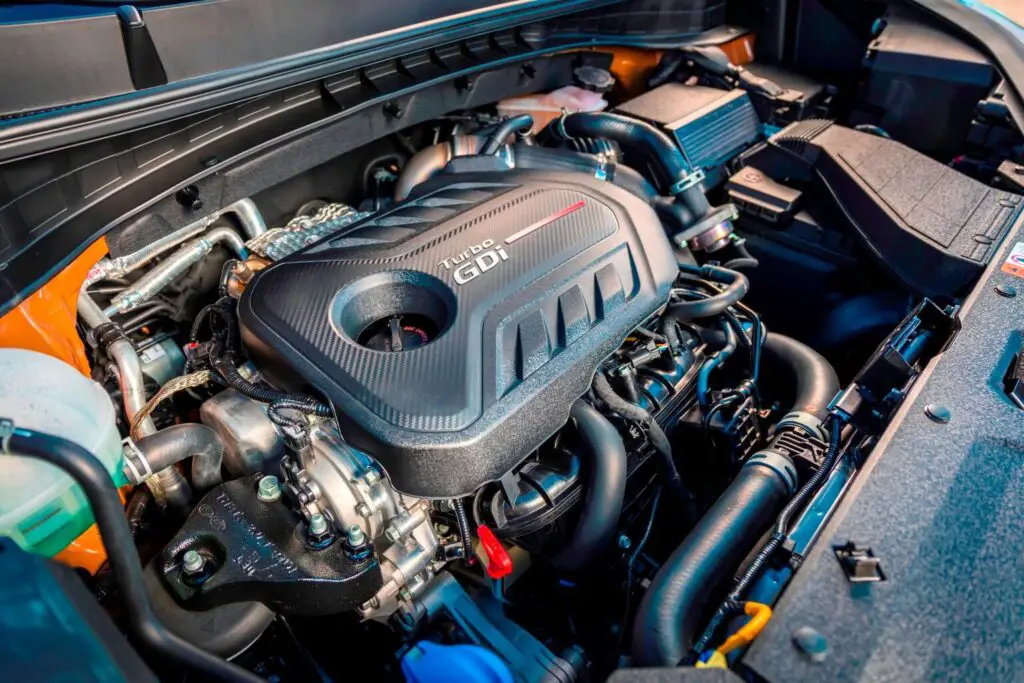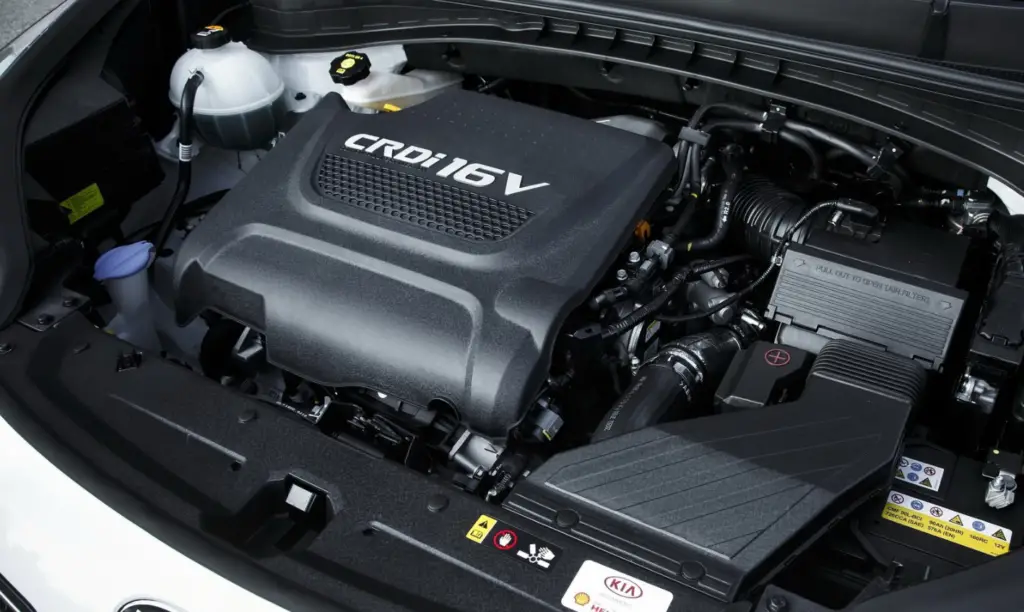Kia Sportage engine problems include issues such as excessive oil consumption, engine misfires, and timing chain failures. These problems can often be addressed with regular maintenance, timely repairs, and replacing worn-out components to keep the engine running smoothly.
The Kia Sportage is a well-regarded compact SUV, praised for its affordability, stylish design, and reliable performance. Over the years, the Sportage has won many loyal customers thanks to its well-balanced engine, comfortable ride, and advanced features. However, like any vehicle, the Kia Sportage is not without its share of engine problems. Knowing these common issues can help owners diagnose and resolve them before they lead to more serious damage.
This article will take an in-depth look at the most common engine problems reported by Kia Sportage owners, possible causes of these problems, and how to address them to keep the engine running smoothly for years to come.

Contents
Common Kia Sportage Engine Problems
While the Kia Sportage is known for its reliability, certain engine issues have surfaced across various model years. Knowing these common problems will help owners address them early and ensure the vehicle’s longevity and performance.
1. Excessive Oil Consumption
Excessive oil consumption is one of the most frequently reported problems in the Kia Sportage, particularly in the 2.4L and 2.0L engine variants. Owners have noted that their Sportage burns oil at an abnormal rate, leading to frequent oil changes and topping up between scheduled oil change intervals. This issue tends to be more pronounced in certain model years, particularly from 2011 to 2017.
Symptoms of Excessive Oil Consumption:
- Oil warning light coming on frequently
- Oil levels dropping below the minimum mark between oil changes
- Exhaust smoke, usually blue in color
- Engine misfires or rough running due to low oil levels
Potential Causes:
- Worn piston rings: When the piston rings wear out, they allow oil to enter the combustion chamber, where it burns alongside the fuel, leading to excessive oil consumption.
- Faulty valve seals: If the valve seals degrade over time, oil can leak into the combustion chamber and burn off, causing the engine to consume more oil.
- Defective PCV (Positive Crankcase Ventilation) system: The PCV valve helps to remove gases from the engine’s crankcase. If it malfunctions, it can lead to increased oil consumption.
Solutions:
- Regularly monitor the oil levels and top up as necessary.
- Ensure that you’re using high-quality, manufacturer-recommended oil.
- Have the engine inspected by a Kia technician, who may recommend replacing the piston rings, valve seals, or fixing the PCV system to solve the oil consumption issue.
2. Timing Chain Issues
Timing chain issues have been a problem reported in several Kia Sportage models, particularly in those equipped with the 2.4L Theta II engine. A timing chain helps synchronize the rotation of the crankshaft and camshaft, ensuring that the engine’s valves open and close at the correct time. If the timing chain or its components malfunction, it can lead to serious engine damage.
Symptoms of Timing Chain Issues:
- Rattling or knocking noises from the engine, especially during startup
- Poor acceleration or power loss
- Illuminated check engine light or misfire codes
- Rough idling or engine hesitation
Potential Causes:
- Worn timing chain: Over time, the timing chain can stretch or become worn out, leading to improper timing and engine misfires.
- Faulty timing chain tensioner: The tensioner keeps the timing chain taut. If it fails, the timing chain may slacken, causing rattling or skipping.
Solutions:
- If you hear abnormal noises coming from the engine, immediately stop driving the vehicle and get it inspected.
- Regularly change the engine oil, as poor lubrication can lead to premature wear of the timing chain and its components.
- If the timing chain is stretched or the tensioner is faulty, replacing these components is the solution. This repair can be expensive, but addressing the issue early can prevent catastrophic engine failure.
3. Engine Misfires
Engine misfires are another common issue that Kia Sportage owners face. Misfires occur when the engine’s fuel and air mixture fails to combust properly. This can lead to rough idling, decreased performance, and poor fuel economy. Misfires in the Sportage may be linked to issues with the ignition system, fuel system, or engine components.
Symptoms of Engine Misfires:
- Rough or uneven idling
- Decreased acceleration and power
- Poor fuel economy
- Check engine light or misfire codes
Potential Causes:
- Faulty ignition coils or spark plugs: Worn or damaged ignition coils and spark plugs are a common cause of misfires.
- Clogged fuel injectors: If the fuel injectors become clogged or dirty, they can fail to deliver the proper amount of fuel to the engine, leading to a misfire.
- Vacuum leaks: A vacuum leak can disturb the engine’s air/fuel mixture, leading to misfires and poor engine performance.
Solutions:
- Replace faulty ignition coils and spark plugs to ensure proper combustion.
- Regularly clean or replace the fuel injectors to prevent clogging.
- Inspect and replace damaged hoses to fix vacuum leaks.
4. Overheating Issues
Overheating is a serious issue that can damage your Kia Sportage’s engine. When the engine gets too hot, it can lead to serious damage, such as a blown head gasket, warped cylinder heads, or even complete engine failure. Overheating issues are often linked to problems within the cooling system, including the radiator, thermostat, and water pump.
Symptoms of Engine Overheating:
- Rising temperature gauge or warning lights
- Coolant leakage underneath the vehicle
- Steam or smoke coming from the engine bay
- A loss of power or rough engine performance
Potential Causes:
- Low coolant levels: A lack of coolant can cause the engine to overheat. This can happen if the cooling system is leaking or if the coolant is not properly maintained.
- Malfunctioning thermostat: A faulty thermostat can cause the engine to overheat by not regulating the coolant flow correctly.
- Damaged water pump: If the water pump is broken or malfunctioning, coolant cannot circulate properly, leading to overheating.
Solutions:
- Regularly check the coolant levels and top them up as needed.
- Inspect the radiator, hoses, and water pump for signs of damage or leakage.
- Replace the thermostat if it’s not functioning correctly.
- Address any leaks promptly to avoid overheating.
5. Turbocharger Problems (For Turbocharged Models)
The Kia Sportage offers turbocharged engine options in certain models, and while these engines are known for their strong performance and fuel efficiency, they can experience problems related to the turbocharger. Issues with the turbocharger can cause a loss of power, unusual noises, and poor acceleration.
Symptoms of Turbocharger Problems:
- Loss of acceleration or power
- Whining or whistling noises coming from the engine
- Decreased fuel economy
- Black smoke from the exhaust
Potential Causes:
- Oil contamination: If the engine oil becomes contaminated, it can damage the turbocharger, leading to power loss.
- Clogged air filters: A clogged air filter can restrict airflow to the turbo, causing it to underperform.
- Worn-out bearings: Over time, the bearings in the turbo can wear out, leading to inefficiency and noise.
Solutions:
- Regularly change the engine oil and use the manufacturer’s recommended oil type to prevent oil contamination.
- Replace air filters and check the air intake system regularly.
- If symptoms persist, have the turbocharger inspected and repaired or replaced as necessary.

Maintenance Tips to Prevent Kia Sportage Engine Problems
To ensure the longevity and reliability of the Kia Sportage’s engine, consider the following maintenance practices:
- Regular Oil Changes: Use high-quality oil and change it at the recommended intervals to prevent many engine issues.
- Inspect Coolant System: Ensure that the radiator, hoses, and coolant levels are maintained properly to avoid overheating.
- Fuel System Maintenance: Regularly clean or replace fuel injectors to prevent clogging.
- Spark Plug and Ignition Coil Replacement: Replace spark plugs and ignition coils to maintain smooth engine performance.
- Check Air Filters and Turbochargers (for turbocharged models): Clean or replace air filters to maintain airflow and inspect the turbocharger regularly for any signs of wear.
Frequently Asked Questions
Here are some FAQs about Kia Sportage engine problems –
1. Is excessive oil consumption a common issue in Kia Sportage models?
Yes, some Kia Sportage models, particularly those with the 2.4L engine, have reported excessive oil consumption. Monitoring oil levels regularly can help mitigate the issue.
2. What should I do if my Kia Sportage engine starts misfiring?
Engine misfires can be caused by faulty ignition coils or clogged fuel injectors. Replacing these components can restore proper engine function.
3. How can I prevent engine overheating in my Kia Sportage?
Regularly check coolant levels and ensure the radiator and water pump are functioning properly to prevent overheating.
4. What are the signs that my turbocharger is failing?
Loss of acceleration, unusual whining noises, and black smoke from the exhaust are signs of potential turbocharger problems.
5. How often should I change the oil in my Kia Sportage?
It’s recommended to change the oil every 5,000 to 7,500 miles, or as per the manufacturer’s maintenance schedule, to keep the engine running smoothly.
Conclusion
The Kia Sportage, while generally a reliable and well-equipped vehicle, is not immune to certain engine-related issues. Problems such as excessive oil consumption, timing chain issues, turbocharger problems, and engine misfires can arise, but with regular maintenance and early diagnosis, these problems can be mitigated.
If you’re experiencing any of the symptoms listed above, it’s crucial to consult a certified Kia mechanic to address the issue before it leads to more significant damage. By following a proper maintenance schedule, you can enjoy the reliable performance of the Kia Sportage for many years.